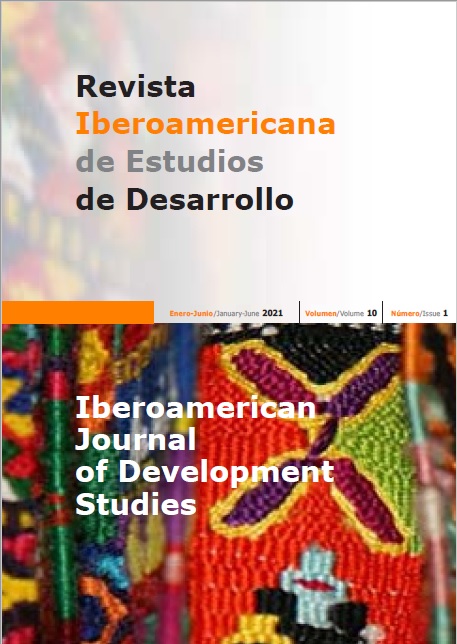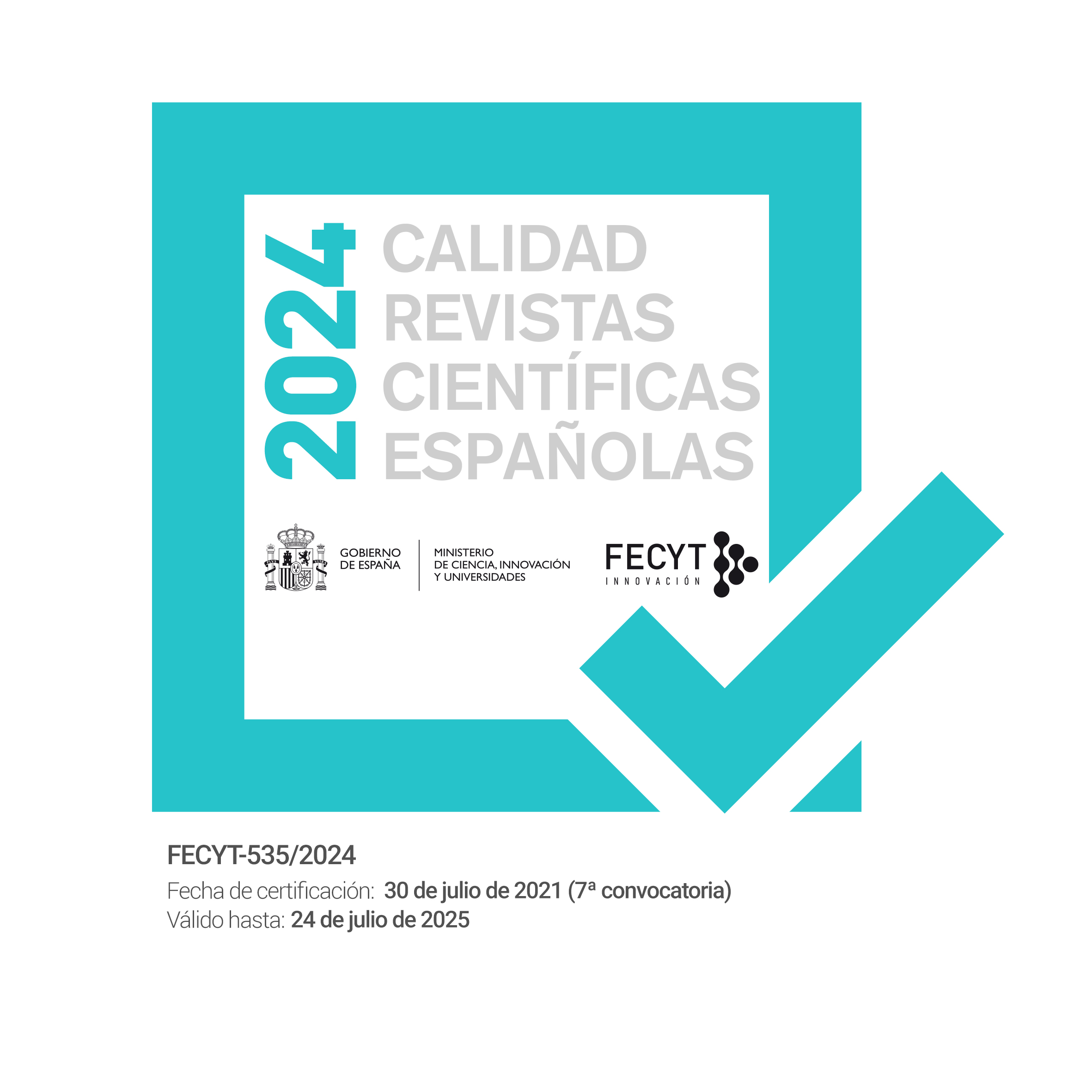CELAC beyond post-hegemonic regionalism
DOI:
https://doi.org/10.26754/ojs_ried/ijds.406Keywords:
post-hegemonic regionalism, regional integration, CELAC, Latin AmericaAbstract
In the beginning of the second decade of the 21st century, the Community of Latin American
and Caribbean States (CELAC) seems to be the most finished expression of what was described as a «post-hegemonic regionalism», at a historical moment in which the Latin American States, without
import their political profile, they agreed in questioning US hegemony and other powers in the region, in favor of a more just multipolar order. However, to the extent that regional political forces were reconfigured, the idea of this type of regionalism was questioned, especially for not reaching conclusive conceptualizations. Therefore, the objective of this article is to discuss the concept of
post-hegemonic regionalism in Latin America from CELAC, which would have been the regional body that incubated the essential features of that conceptualization.
Downloads
References
ALTMANN J (2007). Cuadernos Integración en América Latina, Dossier Grupo de Río. Flacso, San José.
AMIN S (1989). Las nuevas formas del movimiento social. Estudios del Colegio de México 20(8):223-228.
AMIN S (2013). The implosion of contemporary capitalism. Monthly Review Press, Nueva York.
ARRIGHI G (2018). El largo siglo XX. Dinero y poder en los orígenes de nuestra época. Akal, Madrid.
ARRIGHI G, SILVER BJ (2001). Caos y orden sistémico en el sistema-mundo moderno. Akal, Madrid.
AYLLÓN B (2015). La Celac: avances en la articulación regional de la cooperación. Revista Cooperamos 8:19-23.
BENZI D, NAREA M (2018). El regionalismo latinoamericano más allá de los «pos», el fin de ciclo y los fantasmas globales. Nueva Sociedad 275:106-120.
BRICEÑO J, MORALES I. (2017). Post-Hegemonic regionalism in the Americas: toward a Pacific-Atlantic Drive? Routledge, Londres.
BRICEÑO J, RIBEIRO A (2015). Post-hegemonic Regionalism, UNASUR, and the Reconfiguration of Regional Cooperation in South America. Canadian Journal of Latin American and Caribbean Studies 40(1):48-62.
BRUCKMANN M (2011). América Latina y la disputa global por los recursos naturales: Estrategias hegemónicas y contrahegemónicas. América Latina en Movimiento 466(35):20-29.
CASAS A (2015). Los préstamos de China en América Latina crecieron 22,000 millones, 2 de febrero. http://elpais.com/economia/2015/02/27/actualidad/1425072766_388301.html , acceso 20 de septiembre de 2017.
CEPAL (2016). Relaciones económicas entre América Latina y el Caribe y China, oportunidades y desafíos. Naciones Unidas, Santiago de Chile.
CEPAL (2018). Explorando nuevos espacios de cooperación entre América Latina y el Caribe y China. Santiago de Chile. Naciones Unidas.
CLEMENTE D (2017). El regionalismo post-hegemónico en perspectiva crítica: una mirada neogramsciana. Brasil, Venezuela y la opción contra-hegemónica. Observatorio Latinoamericano y Caribeño 1:109-130.
CLOSA C (2016). Governance structures and processes in integration organizations, Formalization of institutional credible commitments for governance. En: Closa C, Casini L. Comparative Regional Integration, Governance and Legal Models. Cambridge University Press (Reino Unido), pp. 1-153.
COX R (1992). Towards a post-hegemonic conceptualization of world order: reflections on the relevancy of Ibn Khaldun. En: Rosenau J, Czempiel EO (eds.). Governance without Government: Order and Change in World Politics. Cambridge University Press (Reino Unido), pp. 132-159.
DEPARTAMENTO DE AMÉRICA LATINA Y EL CARIBE DEL MINISTERIO DE RELACIONES EXTERIORES DE CHINA (2016). ABC sobre el foro China-Celac.
DEUTSCHE WELLE (DW) (2017). A la sobra de Trump termina tímida cumbre de la Celac, 26 de enero. http://www.dw.com/es/a-la-sombra-de-trump-termina-tímida-cumbre-de-la-celac/a-37277113, acceso 12 octubre de 2017.
GALLAGHER KP (2016). The China Triangle, Latin America’s China Boom and the Fate of Washington Consensus. Oxford (EE. UU.).
GALLAGHER KP, MYERS M (2019). China-Latin America Finance Database. Washington. Inter-American Dialogue.
GAUSSENS P (2017). Tomar el poder sin cambiar el mundo, el fracaso de la izquierda latinoamericana. Yecolti Editorial, México.
GUAMÁN A, ARAGONESES A, MARTÍN S (dirs.) (2019). Neofascismo, la bestia neoliberal. Siglo XXI, Madrid.
HARVEY D (2015). Breve historia del neoliberalismo. Akal, Madrid.
KEOHANE RO (1984). After hegemony, Cooperation and Discord in the World Political Economy. Princeton University Press, Nueva Jersey.
LEGLER T (2013). Post-hegemonic regionalism and sovereignty in Latin America, Optimist, skeptics and an emerging research agenda. Contexto internacional 35(2):325-352.
LO BRUTTO G, CRIVELLI E (2017). La Comunidad de Estados Latinoamericanos y Caribeños (Celac) en la reconfiguración de la integración regional post-hegemónica. Revista de Cooperación y Desarrollo 1(4):126-136.
LO BRUTTO G, GONZÁLEZ CH (2015). La influencia china en la cooperación Sur-Sur latinoamericana, durante la segunda década del siglo XXI. Catedra de Cooperación Internacional con Iberoamérica DT Cooperación y Desarrollo 2015/02:1-15.
LÓPEZ F (2016). América Latina: crisis del posneoliberalismo y ascenso de la nueva derecha. Clacso, Buenos Aires.
MENGANA M (2019). Celac: de la convergencia a la parálisis, http://observatorio.repri.org/artigos/celac-de-la-convergencia-a-la-paralisis/, acceso 16 de octubre de 2019.
MOTTA P, RÍOS SP (2007). O regionalismo pós-liberal na América do Sul: origens, iniciativas e dilemas. Serie Comercio Internacional 82. Cepal, Santiago.
MUHR T (2018). En búsqueda de la relevancia del G-77 y China para América Latina y el Caribe: diez tesis sobre la cooperación Sur-Sur en el siglo XXI. Línea Sur 13:149-159.
PERROTTA D (2013). La integración regional como objeto de estudio, de las teorías tradicionales a los enfoques actuales. En: Llanderrozas L (ed.). Relaciones Internacionales. Teorías y debates. Eudeba, Buenos Aires, pp. 197-252.
PERROTTA D, PORCELLI E (2019). El regionalismo es lo que la academia hace de él. Revista Uruguaya de Ciencia Política 28(1):183-218.
PETERSEN M, SCHULZ CA (2018). Setting the Regional Agenda: A Critique of Posthegemonic Regionalism. Latin American Politics and Society 60(1):102-127.
QUILICONI R, RIVERA R (2019). La elipsis de la política exterior en Ecuador: del regionalismo autonómico al neoliberal. Análisis Carolina 23:1-15.
QUILICONI R, SALGADO R (2017). Latin American Integration: Regionalism à la Carte in a Multipolar World? Colombia Internacional 92:15-41.
RIGGIROZZI P (2012). Re-territorializando consensos: hacia un regionalismo post-hegemónico en América Latina. Anuario de Integración 9:129-152.
RIGGIROZZI P, TUSSIE D (eds.) (2012). The Rise of Post-Hegemonic Regionalism: The Case of Latin America. Springer, Nueva York.
RIGGIROZZI P, TUSSIE D (2018). Claves para leer al regionalismo sudamericano: fortaleciendo el Estado, regulando el mercado, gestionando autonomía. Perspectivas 3(5):6-21.
RÍOS X (2014). Bienvenido, Míster Mao. Akal, Madrid.
RIVAS F, LAFUENTE J (2019). Argentina busca el apoyo de México para impulsar un eje progresista en América Latina, 4 de noviembre. https://elpais.com/internacional/2019/11/03/argentina/1572800666_317061.html, acceso 4 de noviembre de 2019.
ROJAS F (ed.), América Latina: desarrollo y perspectivas democráticas. Flacso (Costa Rica), pp. 57-83.
ROJAS R (2017). La fractura de América Latina, 15 de agosto. https://elpais.com/elpais/2017/08/15/opinion/1502787576_748135.html, acceso 12 de octubre de 2017.
ROLDÁN A, CASTRO AS, PÉREZ CA, ECHAVARRÍA P, EVAN R (2016). La presencia china en América Latina, comercio, inversión y cooperación económica. Fundación Konrad Adenauer, Bogotá (Colombia).
SANAHUJA JA (2008). Del «regionalismo abierto» al «regionalismo post-liberal». Crisis y cambio en la integración regional en América Latina. En: Anuario de la integración regional de América Latina y el Gran Caribe 2008-2009. Cries, Buenos Aires, pp. 11-54.
SANTOS GM (2010). Cumbre de la Unidad de América Latina y el Caribe. LXI Legislatura Cámara de Diputados-CDIA, Quintana Roo.
SERBIN A, MARTÍNEZ L, RAMANZINI JH (2012). El regionalismo post-liberal en América Latina y el Caribe: nuevos actores, nuevos temas, nuevos desafíos. Anuario de Integración Regional de América Latina y el Gran Caribe 9:7-18.
SRE [México] (2017). Declaración de Lima. https://www.gob.mx/sre/prensa/declaracion-de-lima?state=published, acceso 27 de octubre de 2019.
VACA W (2017). Región América Latina: procesos regionales entre la dependencia y la autonomía. Iconos 57:1-20.
VADELL JA (2018). El Foro China-Celac y el nuevo regionalismo multipolar: desafíos para la cooperación Sur-Sur. Carta Internacional 13(1):6-37.
VAROUFAKIS Y (2016). El minotauro global. Crítica, Ciudad de México.
VELTMEYER H, PETRAS J (2015). El neoextractivismo ¿un modelo posneoliberal de desarrollo o el imperialismo del siglo XXI? Crítica, México.
WALLERSTEIN I (2016). El capitalismo histórico. México, Siglo XXI.
WENDT A (1992 [2009]). La anarquía es lo que los Estados hacen de ella: la construcción social de la política de poder. En: Santa Cruz A (ed.) El Constructivismo y las relaciones internacionales. CIDE, México, pp. 125-174.
Downloads
Published
How to Cite
Issue
Section
License
Copyright (c) 2021 Eduardo Crivelli, Giuseppe Lo Brutto

This work is licensed under a Creative Commons Attribution-NonCommercial-NoDerivatives 4.0 International License.








